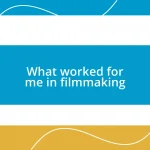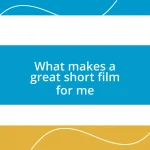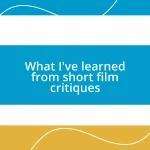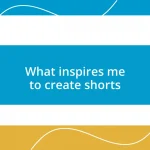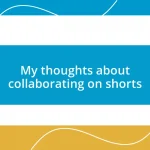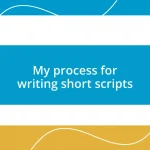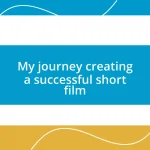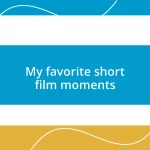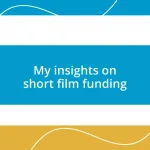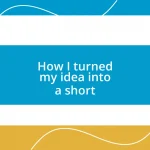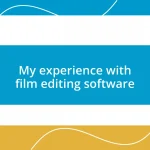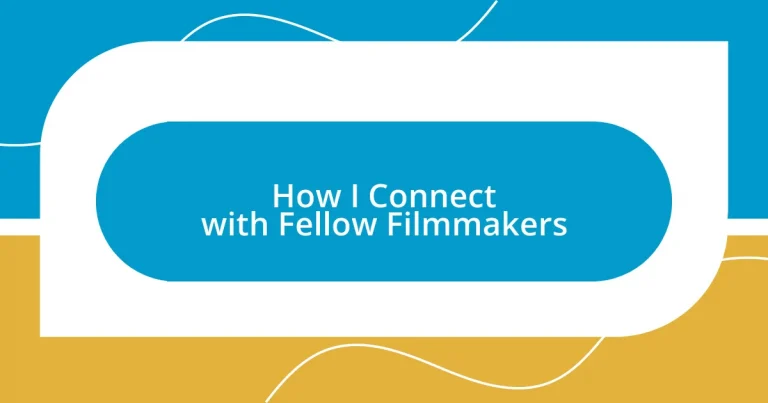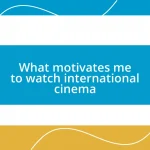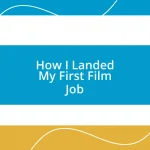Key takeaways:
- Networking is essential in filmmaking, as it fosters collaboration, support, and personal growth through shared experiences and insights.
- Engaging with the right filmmaker communities—including online platforms, local festivals, and workshops—can lead to valuable connections and opportunities.
- Maintaining relationships through consistent follow-ups and in-person interactions enhances collaborations and strengthens the filmmaker community.
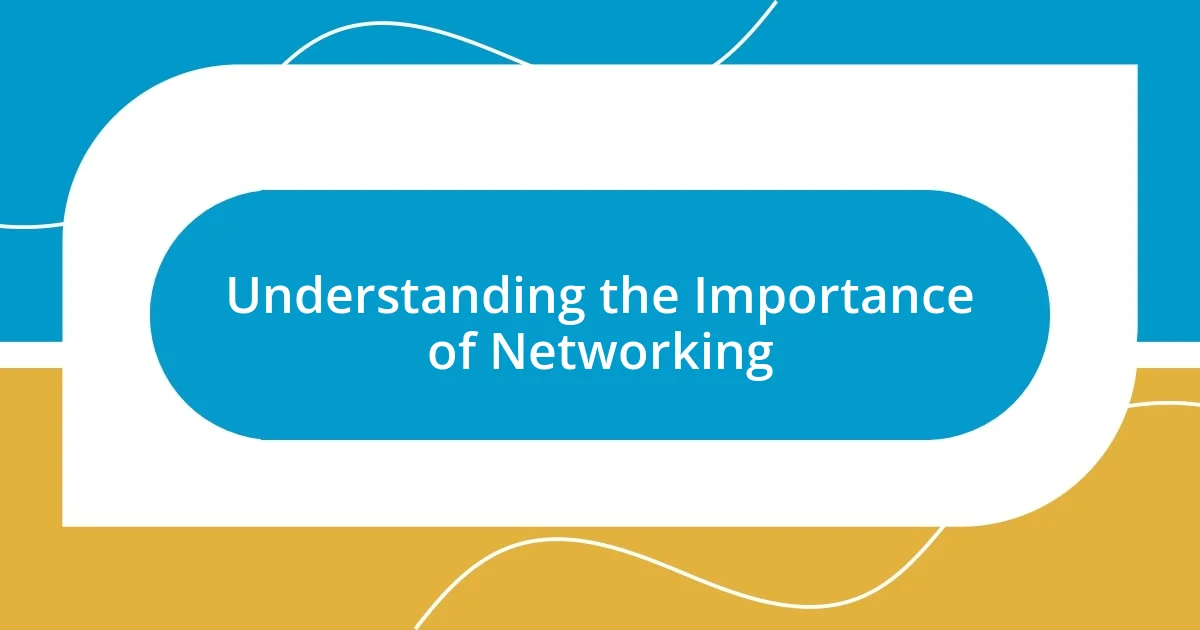
Understanding the Importance of Networking
Networking in the film industry is vital; it opens doors to opportunities that might otherwise stay closed. I remember attending my first film festival as a fresh-faced filmmaker. It was daunting! However, I discovered that a simple conversation with another attendee led to a collaboration that shaped my early career.
I often reflect on how relationships in filmmaking can transform both your projects and personal growth. Isn’t it interesting how one connection can lead to invaluable resources, insights, or even just a supportive friend in a challenging industry? By sharing experiences and exchanging ideas, we nurture our creativity and become part of a vibrant community.
Not every connection will lead directly to a blockbuster, but the insights and encouragement from fellow filmmakers can enrich our craft significantly. I recall a late-night chat over coffee with an experienced director who shared her failures as openly as her successes. That frankness reminded me that networking is not just about gaining—it’s also about giving and learning together in our shared passion.
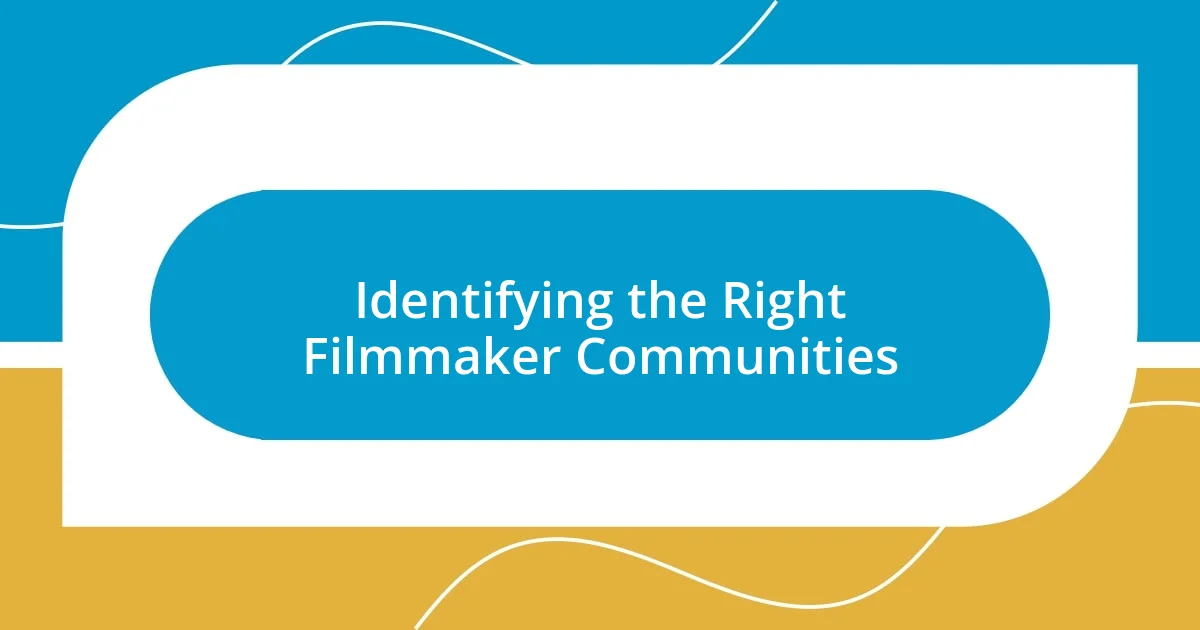
Identifying the Right Filmmaker Communities
Identifying the right filmmaker communities can sometimes feel like looking for a needle in a haystack. I remember trying to find my niche when I first began my journey in film. It wasn’t easy, but I discovered that joining specific groups or attending particular events helped me connect with like-minded individuals who were just as passionate about storytelling as I am.
To help you narrow down your search, here are some avenues worth exploring:
- Online Forums and Social Media: Platforms like Reddit or Facebook groups focus on filmmaking.
- Local Film Festivals: They’re not just for showcasing your work; they are great for networking.
- Community Workshops: These can offer both learning opportunities and access to a network of aspiring filmmakers.
- Film Schools or Alumni Groups: Engaging with past students can lead to collaborations and mentorships.
- Meetup Events: Look for local gatherings that celebrate filmmaking; often, they’re rich in opportunities.
Each of these communities can provide invaluable insights and connections. Take the time to explore them based on your interests and location. You never know where your next collaboration might come from!
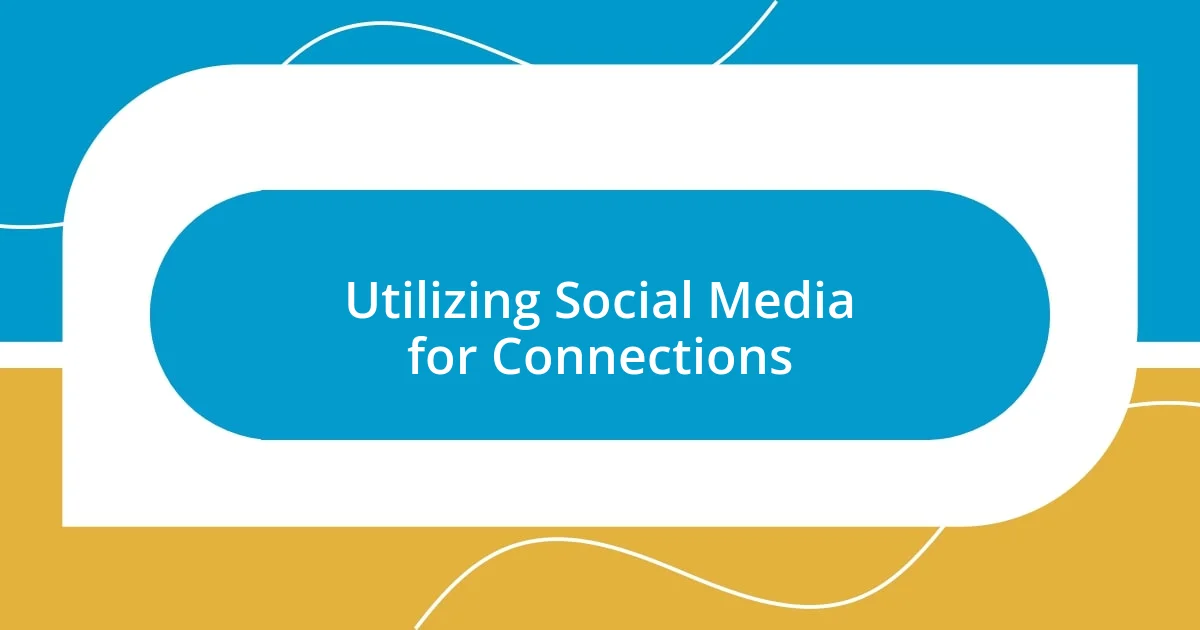
Utilizing Social Media for Connections
Utilizing social media has transformed the way filmmakers connect with one another. I vividly remember the first time I joined a Facebook filmmaking group. The warmth and support from fellow members was palpable, and within weeks, I had formed friendships that transcended online interactions. Each comment and post was a reminder that we’re all navigating this challenging industry together.
Instagram has also been a game changer for me. I started sharing snippets of my projects, and soon found myself engaging with a wider audience. The encouragement from others motivated me to push my creative boundaries. One time, I received a message from a stranger who loved my work and wanted to collaborate. That simple DM led to an incredible partnership that taught me the power of showing vulnerability online.
Similarly, platforms like Twitter can facilitate spontaneous conversations that lead to unexpected connections. I remember chiming in on a trending topic about film techniques. Out of nowhere, a well-known cinematographer responded, sparking a dialogue that eventually led to a mentorship. Who would have thought that a few tweets could change the trajectory of my career?
| Platform | Benefit |
|---|---|
| Opportunities for community building and direct communication. | |
| Visual storytelling that showcases your work and creativity. | |
| Quick interactions that can lead to mentorship and collaborations. |
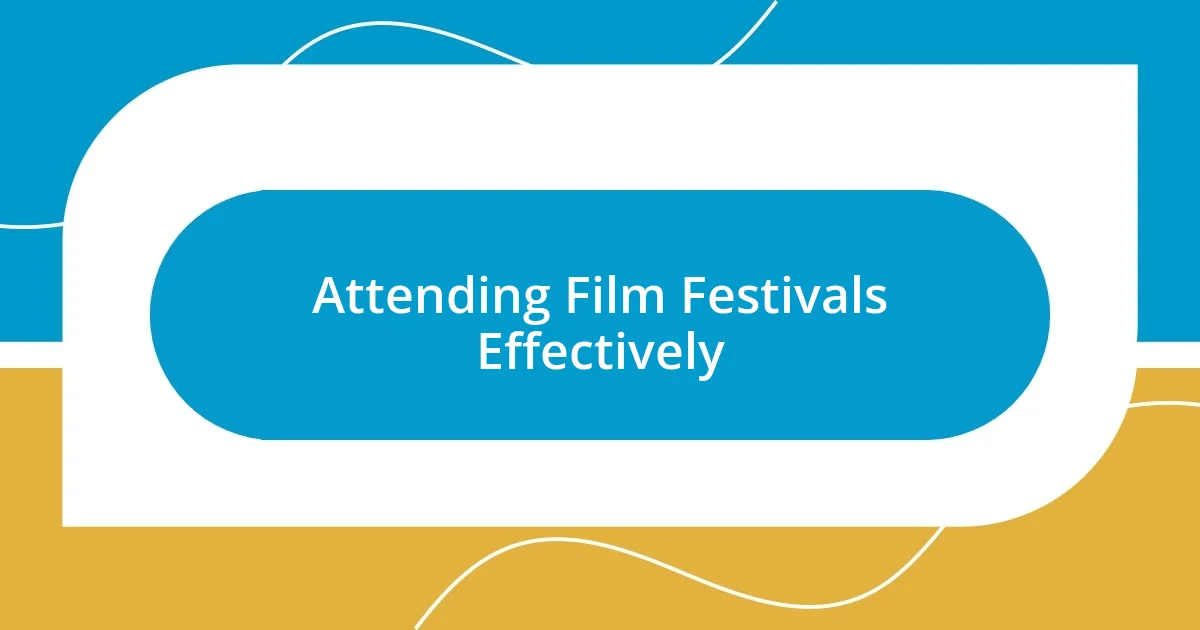
Attending Film Festivals Effectively
Attending film festivals can be a transformative experience, but it requires more than just showing up. One year, I went to a festival with a goal in mind: to meet at least three new filmmakers. Instead of sticking to the usual routine, I forced myself to step out of my comfort zone. I approached a group chatting over coffee and casually asked about their projects. The open atmosphere made it easy to connect, and I left with not just contacts but genuine conversations that sparked new ideas.
Networking isn’t just about exchanging business cards; it’s about creating lasting relationships. I’ll never forget a late-night panel discussion where I met someone who shared my passion for documentary films. We ended up discussing our perspective on storytelling for hours, and that connection led to collaborative efforts that have shaped some of my most rewarding work. Have you ever experienced that instant connection with someone who gets you? It’s exhilarating and incredibly motivating.
Moreover, it’s essential to engage with festival activities beyond film screenings. I made it a point to attend workshops and Q&A sessions, which not only enriched my understanding but also introduced me to fellow creatives with similar interests. I remember bonding with a fellow filmmaker during a workshop about sound design; we shared our challenges and triumphs over lunch, which later turned into a fruitful project collaboration. Those interactions often yield the most significant connections, proving that the festival experience extends far beyond the films themselves.
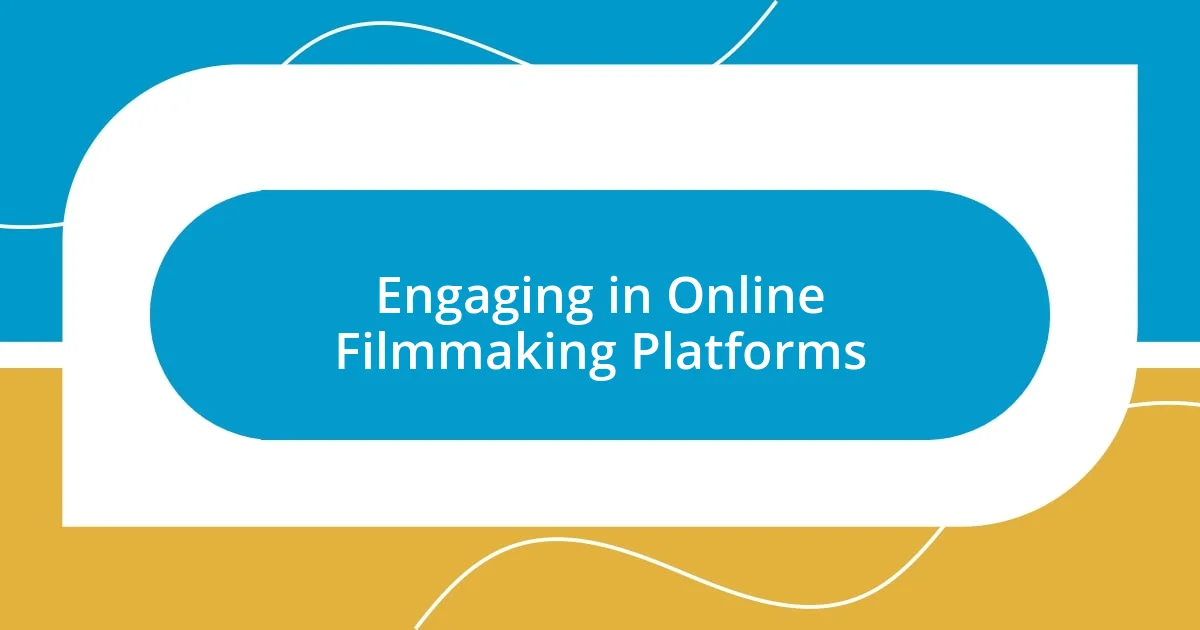
Engaging in Online Filmmaking Platforms
Engaging in online filmmaking platforms offers a treasure trove of opportunities. I recall a specific instance when I shared a rough cut of my film on a platform dedicated to independent filmmakers. The feedback I received was astounding—not only were filmmakers eager to critique, but they also shared their experiences and suggestions that truly improved my work. Isn’t it fascinating how a simple post can elicit discussions that elevate our craft?
In my experience, sites like Vimeo and specialized forums can serve as both inspiration and education. I remember a film school grad who posted a tutorial on lighting techniques that changed my approach entirely. That’s the beauty of such platforms—you get to learn directly from your peers. Have you ever stumbled upon a gem of knowledge while scrolling through a filmmaker’s profile? Those moments often spark new ideas and projects.
Furthermore, it’s not just about exchanging ideas; it’s about building community. There’s something invigorating about seeing a collective of filmmakers rallying together for a cause or a project on platforms like Reddit or Discord. Once, I jumped into a lively discussion about sustainable filmmaking practices, which connected me with a group planning a documentary on environmental issues. Those dialogues can lead to incredibly meaningful collaborations. Don’t you think there’s magic in the shared passion that brings us together, even from miles apart?
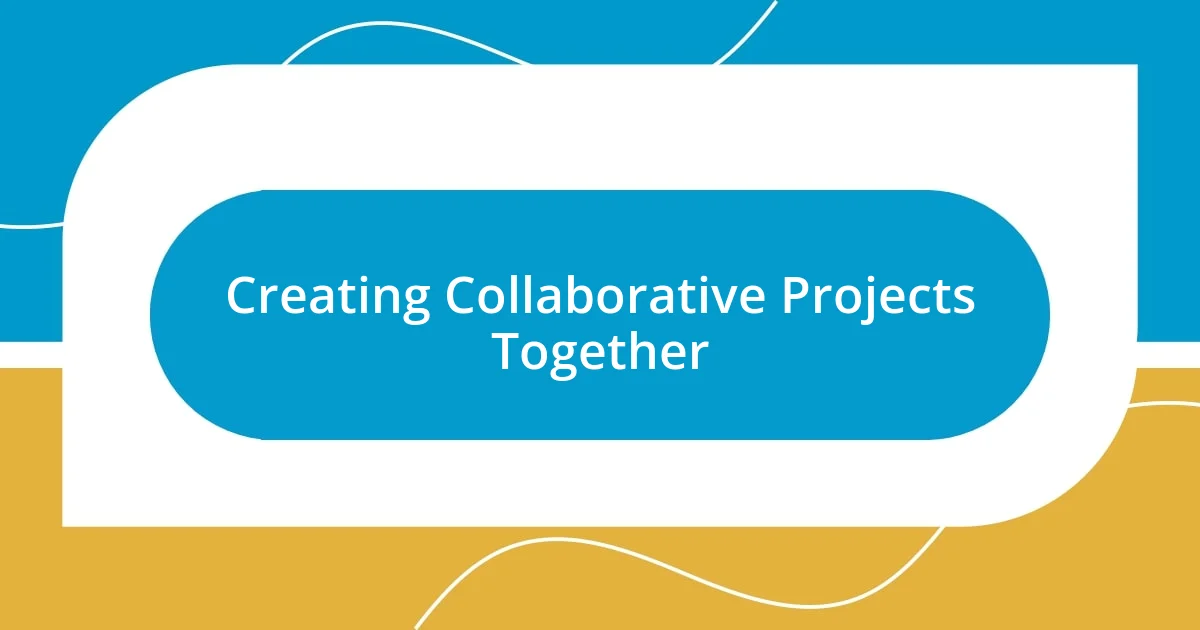
Creating Collaborative Projects Together
Creating collaborative projects often starts with a shared vision that transcends individual efforts. I remember working on a short film where I teamed up with a screenwriter I met at a networking event. We spent hours discussing our inspirations, and I felt an electric energy as we brainstormed concepts together. Have you ever felt that rush when two minds click on a creative idea? It’s an exhilarating experience that can lead to something truly special.
Once, I joined forces with a cinematographer I met during a local film meetup. We decided to create a series of vignettes highlighting different community stories. Collaborating allowed us to blend our strengths—my knack for narrative arcs and her eye for striking visuals. It was fascinating to see how our styles complemented each other, pushing us both to explore new techniques. Isn’t it incredible how collaborative projects can elevate your own work and offer fresh perspectives?
Another memorable collaboration was when I partnered with a group of aspiring filmmakers for a documentary on urban art. We had our fair share of disagreements, but those heated discussions fueled our creativity. Through this experience, I learned the importance of compromise and open communication. Have you experienced a project that challenged you but ultimately transformed your perspective? It’s those collaborative journeys that often shape us into better filmmakers and storytellers.
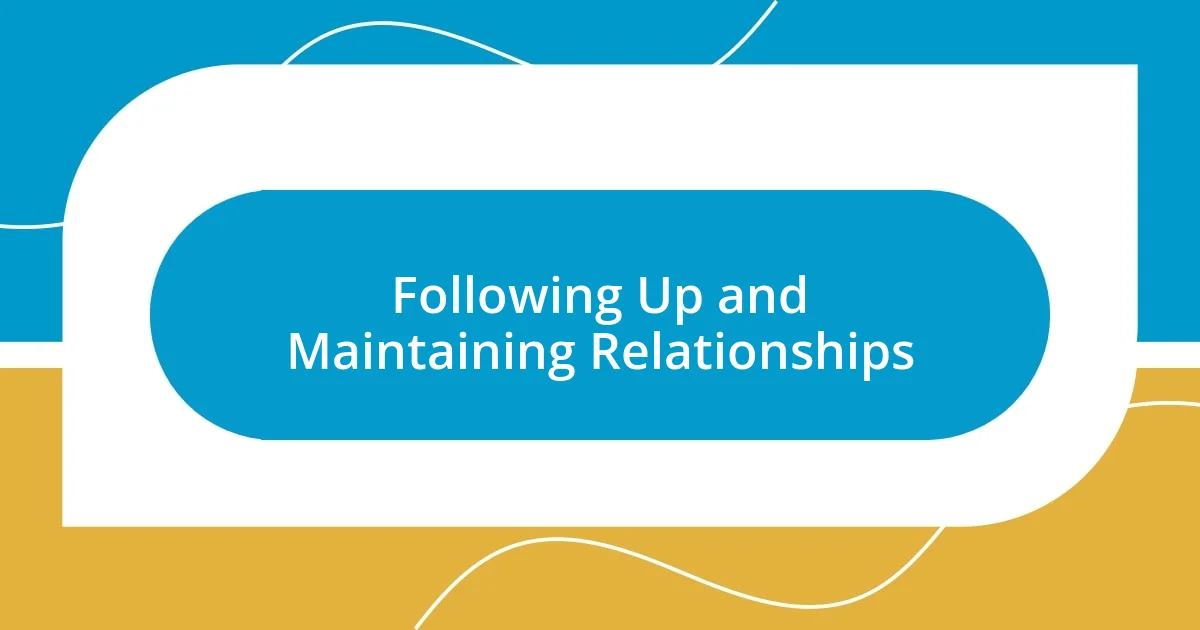
Following Up and Maintaining Relationships
Following up after connecting with fellow filmmakers is crucial for nurturing those relationships. I remember reaching out to a producer I met at a festival a few months later. I sent a simple message to check in and mentioned a project I was working on that reminded me of our conversation. To my surprise, she shared valuable insights and even offered to connect me with some contacts in the industry. Isn’t it enriching when a small gesture can lead to unexpected opportunities?
Maintaining those relationships is just as vital. I’ve learned that consistent communication—whether through emails, social media, or coffee catch-ups—can go a long way. I often send links to articles or films that I think my connections would appreciate based on our past discussions. It’s a simple way to say, “I’m thinking of you,” and it keeps the dialogue flowing. Ever had a moment when a simple message rekindled a connection you thought was lost? Those small touches can rekindle collaborations and friendships alike.
I also believe that attending events, even if briefly, strengthens the bonds formed online. I once dropped by a screening where many familiar faces showed up. Sharing a laugh about a past project while discussing future ideas created an electrifying atmosphere that reminded me why I value these relationships. In essence, those spontaneous encounters often blossom into deeper connections. Don’t you find that face-to-face interactions often add a layer of authenticity to the bonds we create?
